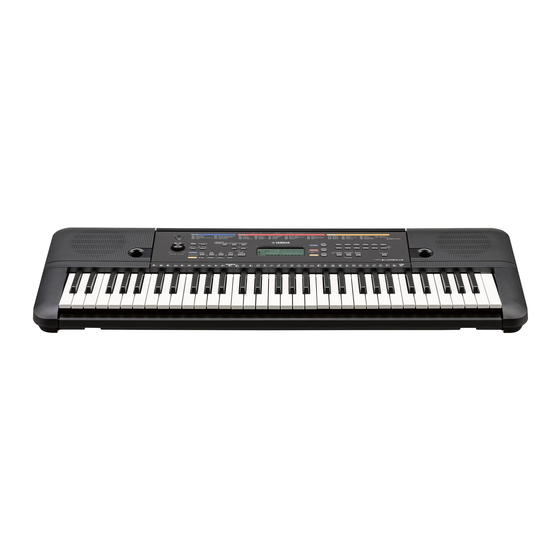Yamaha PSR-E263 Manual del usuario - Página 12
Navegue en línea o descargue pdf Manual del usuario para Teclado electrónico Yamaha PSR-E263. Yamaha PSR-E263 48 páginas. Digital keyboard
También para Yamaha PSR-E263: Manual del usuario (28 páginas), Manual del usuario (28 páginas), Manual del usuario (28 páginas), Manual del usuario (50 páginas), Manual del usuario (28 páginas), Manual del usuario (28 páginas)

Setting Up
Power Requirements
Although the instrument will run either from an AC
adaptor or batteries, Yamaha recommends use of an
AC adaptor whenever possible. An AC adaptor is
more environmentally friendly than batteries and
does not deplete resources.
Using an AC Adaptor
Connect the AC adaptor in the order shown in the
illustration.
DC IN jack
(page 11)
1
WARNING
• Use the specified AC adaptor (page 44) only. Using the
wrong AC adaptor can result in damage to the instrument
or overheating.
WARNING
• When using the AC adaptor with a removable plug, make
sure to keep the plug attached to the AC adaptor. Using the
plug alone can cause electric shock or fire.
• If the plug is accidentally removed from the AC adaptor,
slide it back in until it clicks into place, taking care to
avoid touching any internal metal parts. To avoid electric
shock, short circuit or damage, also be careful that there
is no dust between the AC adaptor and plug.
The shape of the plug differs depending on
your area.
CAUTION
• When setting up the product, make sure that the AC outlet
you are using is easily accessible. If some trouble or mal-
function occurs, immediately turn the power off and dis-
connect the plug from the outlet.
NOTE
• Follow the order shown above in reverse when disconnecting
the AC adaptor.
12
PSR-E263 YPT-260 Owner's Manual
2
AC
AC outlet
adaptor
Plug
Slide the plug as
indicated.
Using Batteries
This instrument requires six "AA" size, Alkaline (LR6)/
Manganese (R6) batteries, or rechargeable nickel-
metal hydride batteries (rechargeable Ni-MH batter-
ies). The Alkaline batteries or rechargeable Ni-MH
batteries are recommended for this instrument, since
other types may result in poorer battery performance.
WARNING
• When the batteries run out, or if the instrument is not to be
used for a long time, remove the batteries from the instru-
ment.
1
Make sure that the power of the instrument is off.
2
Open the battery compartment cover located on
the instrument's bottom panel.
3
Insert the six new batteries, being careful to follow
the polarity markings on the inside of the com-
partment.
4
Replace the compartment cover, making sure that
it locks firmly in place.
NOTICE
• Connecting or disconnecting the power adaptor with bat-
teries installed may turn the power off, resulting in loss of
data being recorded at the time.
• Make sure to set the battery type correctly (page 13).
• When battery power becomes too low for proper opera-
tion, the volume may be reduced, the sound may be dis-
torted, and other problems may occur. When this happens,
make sure to replace all batteries with new ones or already
recharged ones.
